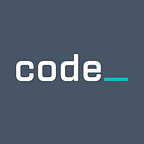Returning to DC: Code.gov at React DC
October had been a busy month for Code.gov because of the various meetups and special events we were invited to attend. After making an impression in Raleigh, North Carolina, the team at Code.gov continued their forward momentum into November with a visit to the React DC Meetup group. If you are curious as to what React is, React is a specific kind of JavaScript library designed for building user interfaces. You create with it components — small chunks of code — that create complex user interfaces for single-page or mobile applications; and React can scale up to larger projects if additional libraries are introduced. The React DC Group of Washington DC is a place where developers and users share their own successes and challenges with this library, and Code.gov was invited to present for their November meetup. Along with Federal Source Code Policy Expert Joe Castle and Front End Developer Daniel J. Dufour, USDS Lead Developer Dave Methvin took part in the presentation, offering their own perspectives on using React in everyday projects.
GSA’s FSCP Expert Joe Castle took the lead in this evening’s discussion, introducing the audience to a history of Open Source in the United States government. While what we do here at Code.gov may appear to be a new idea, Open Source has been part of the government for decades. Joe’s introductory talk set the stage for Code.gov’s Daniel J. Dufour. Daniel offered to the audience (for scrutiny) his own approach to open source projects, which included his own practical applications of React inside Code.gov. Recently a move was made at Code.gov to migrate our site from Angular to React. The reasons for the move:
- Optimized performance for the site (faster download times, quicker responses to search queries, etc.).
- JavaScript (the language React is written is) is more accessible than Typescript (the language of Angular).
- The React Community is a larger, more robust community than Angular’s, offering a wider base for Community Support and discussion over developments and changes within React.
Along with going into the migration of the site, from the decision process to the actual steps needed to make the jump, Daniel also challenged the collected React developers to what they could do to make their own projects better, considering all the many options available to developers in putting together stable, reliable websites. Whether the audience was expecting to think about solutions other than React is hard to say, but you could see Daniel’s questions giving these coders something to consider. Following Daniel was Dave Methvin of the USDS. In his talk, Dave went into the government’s application of React, commenting on how workflows and forms have all improved in performance on account of it. Dave’s own case studies looked at a process that needed efficiency, and how React offered a solution. Our evening with React DC concluded with a last-minute addition to the roster, Sean McBride of Operation Code DC, who extended an invitation to the React DC attendees to a December Hackathon, hosted by his newly-revived meetup group and MilSpouse. Between the two organizations, a special weekend of hacking will occur, both in DC and across the country.
Code.gov’s evening with React DC was an evening of open source history, philosophical questions, practical application, and anticipation for upcoming events. The effect of the evening carried over into the following day with a fresh pull request from one of the event’s attendees. It is that sort of engagement we always welcome! We hope, if you were in attendance, that you enjoyed the meetup as much as we did. If you were unable to attend, come out to the November 28th meetup for the Elastic DC Group happening this week. We want to hear at one of these events about what you are doing with America’s Code, or introducing you to the opportunities we offer. If you would like to talk to us about appearing at a meetup, visit us on Twitter or LinkedIn, and share with us what’s on your mind. We can’t wait to meet you online, or at one of these events, to answer whatever questions you may have for us; and to offer you a chance to make a difference, to innovate, and to create.
Code on.
